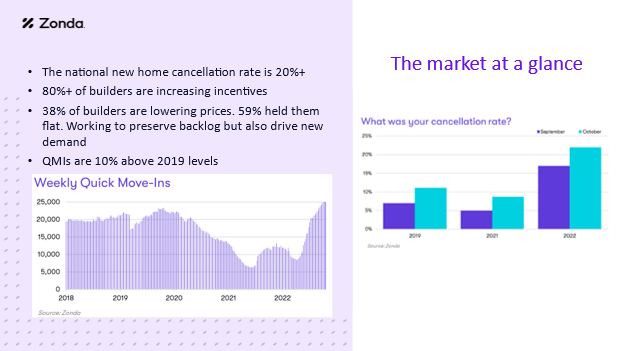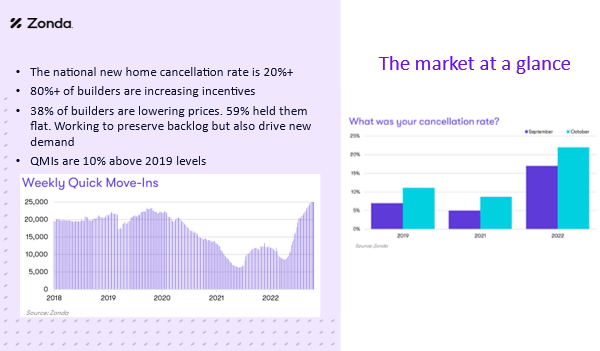Charlotte January 2024 – Key Take Aways
REBIC was created in the 1980’s with a mission to create a healthy real estate market in Charlotte. Today, it covers Mecklenburg, Iredale, Cabarrus, Gaston, and Union County areas. The priorities for 2023 effectively flow into 2024 and are separated into four major categories: (1) Police and Law, (2) Regional Impact, (3) Political Leadership and (4) Membership Development. The City of Charlotte’s ordinance passed in August 2022 and became effective in June 2023 in order to comply with North Carolina 160D legislation and act as the primary tool for implementation of the Charlotte Future 2040 Comprehensive Plan – all within a more user-friendly format designed for clarity on its 13 parts and 40 articles. The undertaking has been sluggish as new requirements are taking time to get used to. Weekly meetings are held to address text amendment approvals and administrative fixes, where possible. REBIC is focusing on six strategies to target housing affordability. Each of these will not affect much alone, but collectively, will make a significant difference in addressing gentrification, offering tax benefits and income streams to those who need and fast-tracking regulatory processes that are often burdensome. Politics are largely affecting regional cooperation. The City of Charlotte is a blue city within a red state. To some degree, they are unwilling to go outside of the city limits to find out what other regions want. Since the General Assembly is Republican, they will listen to mayors within these smaller towns because they are friends and will disregard what the City of Charlotte is advocating for without that support. REBIC wants to facilitate these relationships to help impact transportation, aviation, water, and sewer. With elections looming, REBIC is also hoping to add more experienced real estate professionals to the board so that there is a better understanding of the dynamics that are at play here. (Rob Nanfelt – REBIC)
2023 space consolidations, smaller lease sizes and an excess of older, vacant buildings mark the deepest negative office absorption in Charlotte. However, 2024 shows signs of clarity because many leases signed prior to 2020 have expired, and therefore, deal with less of the decisions that were made prior to the pandemic. (Chuck McShane – CoStar Group)
Terracon continues to stay productive in the multi-family sector, and has growing demand for experienced engineers in the geotechnical environmental arena. (Neal McElveen Terracon – Charlotte)
Ajamu specially services loans across the board for his large debt fund clients. (Ajamu Stoner – SitusAMC)
Slowly but surely, more multi-family buyers have entered the market in 2024 due to the Federal Reserve indicating that they will not raise rates further. (Brent Kubitschek – Waterstone Multi-Housing Advisors)
Beyond Real Estate Capital is a small group, operating out of the Carolinas, looking to expand with non-profits and other partners focused on affordable, multi-family housing. (Caleb Sherrill – Beyond Real Estate Capital)
Poettker Construction Company Southeast is a full-service construction firm focused predominantly on Class A distribution & warehouse projects. (Connor Tomlinson – Poettker Construction Company)
Rodgers Builders is a 60-year-old company headquartered in Charlotte with offices in Raleigh, Wilmington, Charleston and Greenville. They hit an all-time low in the 2020-2022 time frame, raking in $390 million. Last year the amount jumped up to $560 million, because of the resurgence in healthcare, higher education, corporate commercial and cultural entertainment. Projections for 2024 are valued at $780 million. (David Page – Rodgers Builders)
Avery Hall’s offices are located in Brooklyn, NY, Richmond, VA, and Charlotte, NC. Guillermo’s focus lies in redevelopment construction. He currently has four large projects and is not actively looking for more because of the current market condition. (Guillermo Matias – Avery Hall)
Although some deals are falling apart, leasing in smaller industrial and retail are going strong. The Nichols Company remains optimistic for 2024. (Jeff Alexander – The Nichols Company)
Freedom Communities is building an incubator hub for small businesses on Freedom Drive this spring. This gives entrepreneurs an affordable place to rent and brings education and support for them to grow right in the same building. (Mark Talbot – Freedom Communities)
Lincoln Property Company helps builders find land and currently remains busy in Charlotte. Marshall is the President of the Charlotte Region Commercial Board of Realtors and offers it as a tool for knowledge and expertise in the commercial real estate industry. (Marshall Williamson – Lincoln Property Company)
Progressive AE has been an Uptown resident for the past 20 years and is looking to expand into the Detroit metro area for its strong, up-and-coming inversion. The company operates across 10 different sectors and remains optimistic for 2024. If one sector is struggling, another usually holds steady until the other can circle back again. (Wesley Jones – Progressive AE)
There are elevated levels of industrial lending activity in the Southeast, followed closely by multifamily and retail. Banks are avoiding office because it is hard to justify to investors when there is little headwind in the space. People are better off taking their larger projects to the banks that can take the whole note themselves because bringing in a participant right now is a challenge. (Zac Snyder – Carter Bank & Trust)






Recent Comments